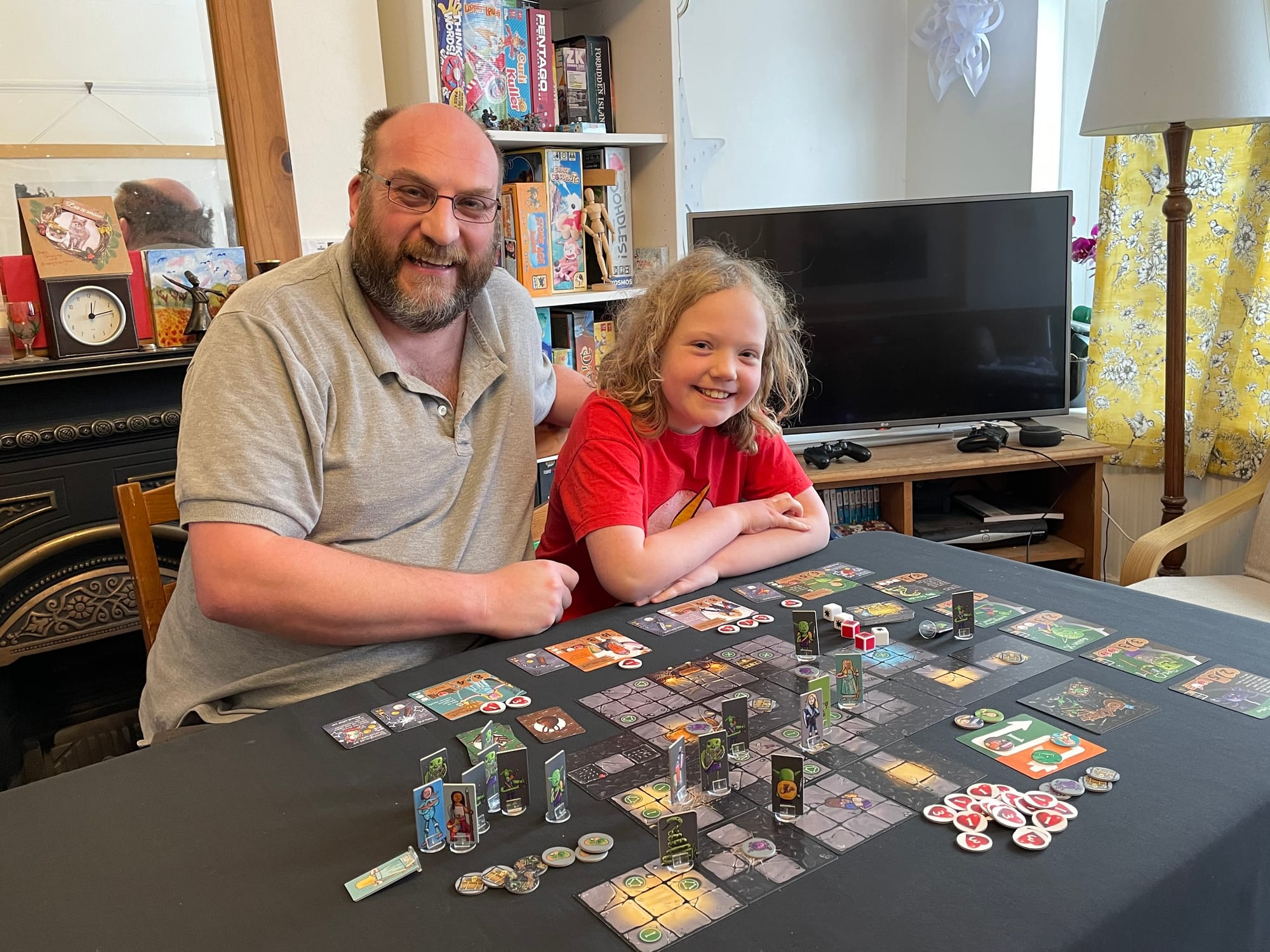
Caves have a primal allure. Yawning in the rough stone of a hillside, even the most claustrophobic person might pause to wonder what’s inside and just how far they go. Perhaps it's something instinctual about seeking shelter. Either way, imagine how much more alluring - and claustrophobic - it might be if that cave was in a fantastical realm filled with all manner of equally fantastic possibilities.
‘It's an easy dopamine hit,’ enthuses James M. Hewitt of Needy Cat Games. You might not know his name but you’ll likely recognise many of his games from his time as a design staffer at Games Workshop, such as Warhammer Quest: Silver Tower, or his later freelance work on titles like Mantic’s Hellboy: The Boardgame.
‘People love games with exploration and character development,’ he continues. ‘Reveal new cards! See what's in the next room! Get a new ability!’
Once they’ve lured you in, however, dungeon crawl games can reveal surprising complexity. ‘They give players the chance to get clever and use a variety of items and abilities in cunning combinations to great effect,’ Hewitt tells me. ‘There's also the general sense of heroism, where your small group of heroes takes on wave after wave of enemies.’
Much like their role-playing cousins, dungeon crawl board games began life in the 1970s at TSR. First off the blocks was the oft-derided Dungeons & Dragons spinoff Dungeon! that despite, or perhaps because of, its randomness still makes for a good family game with plenty of variety and excitement. Other iconic titles soon followed in its footsteps, including The Sorcerer's Cave from 1978 and 1985’s DungeonQuest, itself an Anglicised version of the Swedish game, Drakborgen.
Still, these titles remained relatively niche, more often than not seen as an adjunct to role-playing, a side serving for those already in the hobby. It would be another game, some fifteen years later, that would bring the joy of dungeoneering to the masses and, in a story that will be familiar to many late eighties children, get Hewitt into fantasy gaming.
‘The first one I owned was HeroQuest,’ Hewitt reveals. ‘My dad got it for my birthday and then staunchly refused to play with me until I finally wore him down. It didn't matter, though, it fired my imagination all the same.’
That same iconic title also served as the gateway game for Dan Hughes, the co-designer of recent Kickstarter success CoraQuest with his eight year old daughter, Cora. ‘I remember playing it with friends after school on my bedroom floor,’ he fondly recalls.
Released by Milton Bradley Games in partnership with Games Workshop HeroQuest went to some lengths to mimic the genre’s inspiration in role-playing, casting one of the players as a games master who revealed the labyrinth to the other players and played the monsters. That gave it the familiarity of a board game combined with the mysteries of a role-playing game, a combination that was key to its success.
But it begs another question: why not just role-play instead?
‘A dungeon crawl is invaluable for taking the burden of preparation from a games master,’ Hughes opines. ‘It can often be more relaxing and “beer and pretzels” than an RPG. It also requires less commitment from everyone round the table and can be embarked upon more spontaneously. It’s usually more visually and tactically satisfying too, as the components are tailor made to fit the game rather than cobbled together.’
Hewitt has a different take. ‘Why not play both,’ he quips. ‘Seriously though, to me, the biggest difference is that while an RPG is great for a freeform experience, with a GM who acts as narrator and arbiter, a dungeon board game has a lot more constraint, and can be a lot more focused.’
This gets to the heart of what dungeon board games are often missing, the sense of creativity and imagination that comes from having someone run the game. The fact HeroQuest asked someone to step into that role is part of what made it special. Yet, at the same time, many players are reluctant to take the helm, preferring instead to roll with the excitement of the unknown. It’s a split that’s plagued the genre throughout its development.
‘I often find the most interesting games are the ones that have a foot in both camps,’ Hewitt muses. ‘It's what I was aiming for with Warhammer Quest: Silver Tower. I wanted it to feel like the game was a gamesmaster, pulling out little surprises and tricking you, while still maintaining a fairly constrained ruleset.’
The original Warhammer Quest from 1995 was the culmination of the HeroQuest line, following Advanced HeroQuest. It shed the games master role and was instead fully co-operative, a rarity at the time. Although fondly remembered - Hewitt describes it as having ‘left an indelible mark on my soul’ - it hasn’t aged well.
‘It's been surpassed many times over in terms of its core game design,’ Hewitt admits. ‘But in terms of ambition, scope and the freeform nature of its ongoing campaign, I think it's still hard to beat.’
As part of his attempt to maintain the feel of role-playing within a modern board game’s mechanical framework, Hewitt populated Silver Tower with text paragraphs and mini-games.
‘I wanted to incorporate the puzzle-solving element that you see in a lot of dungeon-based RPGs, but I didn't have the option to include extra components,’ he explains. ‘So the challenge was reusing components in clever ways. Most players have encountered the dice-stacking game. There were other fun encounters. I wanted the game to surprise players, blindside them, and keep them guessing.’
While players were still enjoying the original Warhammer Quest, board gaming was upended by the 1996 release of Settlers of Catan. In its paradigm-shattering wake, the old-fashioned dungeon game fell out of fashion with only sporadic entries for almost a decade. When a new contender for the crown did arrive, however, it blew a blast of fresh air into the moribund, cobwebbed corridors of its forebears.
That game was Descent. It resurrected the games master, now known as the Overlord, and in a new twist, pitted them against the players in a competitive game. It also added some of the design sensibilities from games like Catan, resulting in a game that combined the narrative adventures of old with richer tactics and strategy.
However, it remained plagued by another common flaw of the genre: very long play times. It was also quite mature in content and tone. In addition to the demands of time and complexity Descent was a violent and bleak game.
‘Over the years as the original audience of HeroQuest has grown up the dungeon crawling genre has been pulled up after them, without leaving any crumbs for the generations that follow,’ opines Hughes. ‘Dungeon crawlers are increasingly aimed at adult players, with grim dark and gritty fantasy almost becoming the default settings. I feel there is still plenty of room left to take a sidestep from this direction and explore other tones and settings.’ Which is, of course, exactly what he’s aiming to do with CoraQuest. He admits, though, that he isn’t the first designer to notice this.

‘There are the fantasy games from Jerry Hawthorn, Mice and Mystics and Patchwork Fables,’ he observes. The former game appeared in 2012 and was another big milestone in the genre. Aimed at that old HeroQuest audience who were now old enough to want to recapture its magic with their own children, it included a big book of narrative text to add meat to the adventures. It also leveraged improved production techniques to include a book of heavy duty map boards, much more appealing and convenient than the cardboard tiles of yore.
That same year also saw a new edition of Descent which jettisoned the random dungeons and sprawling play in favour of tighter, more scripted scenarios. ‘It’s my favorite dungeon crawler,’ Hughes admits. ‘This is primarily because the group I played with were incredibly entertaining and enjoyable people to play with. The game mechanics were complex enough to be interesting, but straightforward enough to be able to get out of the way of our fun.’
While the second edition of Descent was released with the same one-versus-many setup of its predecessor, four years later the series would be at the forefront of another revolution in the genre. The previous year the game’s publisher, Fantasy Flight, had released the co-operative XCOM: The Board Game which utilised a companion mobile phone app to drive an enemy AI. They followed this with the Descent: Road to Legend app which allowed players to enjoy the game as a fully co-operative experience, without an attendant Overlord.
It was divisive. ‘There were concerns about apps becoming obsolete and unsupported,’ recalls Hughes. ‘The more players are involved the more intrusive they feel an app becomes, as table talk and banter starts having to be halted to focus on the app. They assist the narrative of the game, but do risk negatively impacting the more meta joy in gaming with others.’
Hewitt sympathises. ‘I totally understand people who like their board games to be analogue experiences,’ he says. But at the same time, both are huge fans of this innovation. ‘They have to be done well, but if they are they can really enhance a game,’ Hewitt continues. ‘I've also really enjoyed seeing apps that read out written passages of text for you. If someone's got to read a descriptive passage and, let's face it, there are often a load of those in this style of game, I'd rather have it done by a professional voice actor than have to do it myself.’
Between the increasing sophistication of apps and the incorporation of design lessons from other genres, the popularity of dungeon crawl games exploded. Now, players could enjoy complex and dynamic strategic challenges with relatively simple rules without the need for one of them to run the game. It also went sideways. Star Wars: Imperial Assault and Warhammer Quest: Blackstone Fortress weren’t the first sci-fi dungeon games: HeroQuest had a classic spin off called Space Crusade. But, alongside Mansions of Madness and Zombicide which took the genre into the horror space, they rode the latest design trends with style.
With the rise of apps, and the hobby’s increasing focus on heavy strategic games, you’d be forgiven for thinking these games represented peak dungeon crawl. But you’d be reckoning without 2017’s Gloomhaven, which combined dungeons with the heavy strategy the hobby hungered for. The result cut across multiple fanbases and was a critical and commercial triumph. It spawned a digital version, an affordable small-box prequel, Gloomhaven: Jaws of the Lion and the Kickstarter for its sequel, Frosthaven, raised almost thirteen million dollars.
Despite the increased competition in the space Hewitt is confident there’s a lot of life left in the genre. ‘I think there's still plenty of room for innovation, and a lot of that can be found by combining the dungeon genre with other types of game, or borrowing mechanical ideas from other genres,’ he says.
‘Whenever we talk to new designers, we tell them that they need to play as many different types of game as possible. If you want to create the next big dungeon crawler, don't just play dungeon crawlers, because all of your inspiration will be stuff that's already been done.’
In fact, at time of writing, it looks as though modern production techniques and crowdfunding are about to bring the genre full circle. Fantasy Flight Games have recently released a new title in the Descent series, Descent: Legends of the Dark, featuring wargame quality miniatures and a ton of cardboard terrain which harks back to HeroQuest. A game that, in turn, has received its own loving re-release raising over a million dollars in crowdfunding. Trends come and trends go but after 40 years the dungeon crawl looks here to stay.
‘They’re the blockbuster action films of board-gaming, Hughes concludes of their enduring appeal. ‘They provide excitement and camaraderie within a familiar framework, and you know exactly what you are going to get before you buy your admission ticket.’
CoraQuest is out now, order now from coraquest.com
For all the latest from James M. Hewitt check needycatgames.com
This feature originally appeared in Wyrd Science Vol.1, Issue 4 (April '23)

